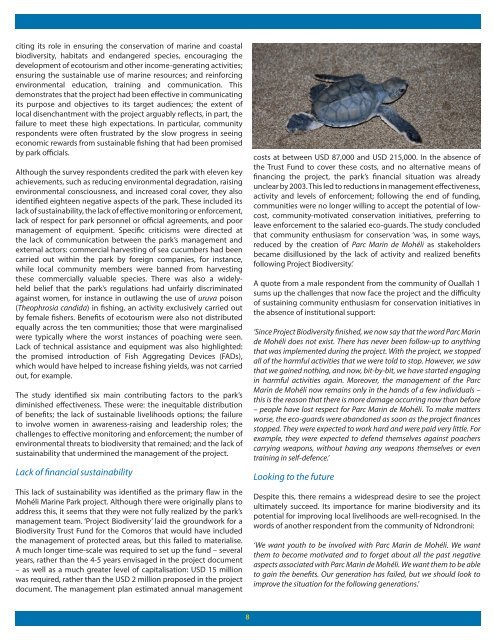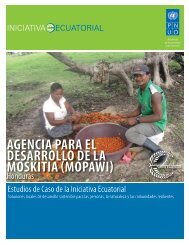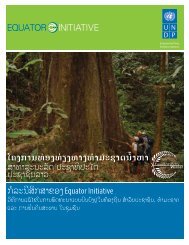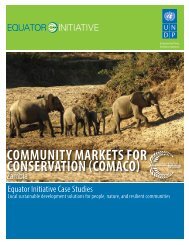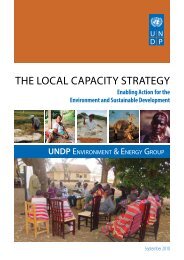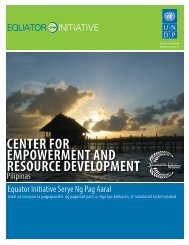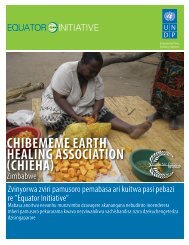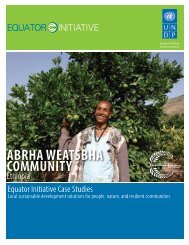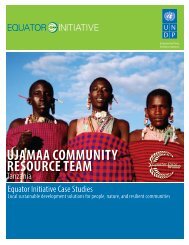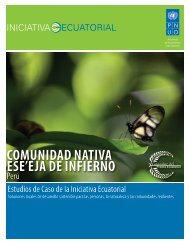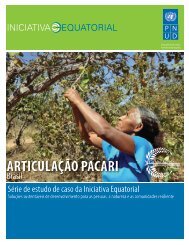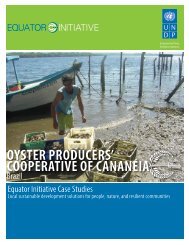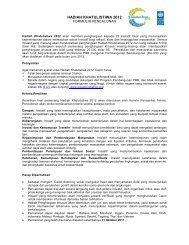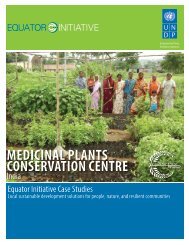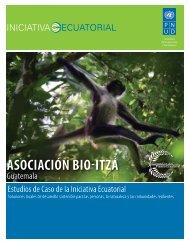MOHÉLI MARINE PARK - Equator Initiative
MOHÉLI MARINE PARK - Equator Initiative
MOHÉLI MARINE PARK - Equator Initiative
Create successful ePaper yourself
Turn your PDF publications into a flip-book with our unique Google optimized e-Paper software.
citing its role in ensuring the conservation of marine and coastalbiodiversity, habitats and endangered species, encouraging thedevelopment of ecotourism and other income-generating activities;ensuring the sustainable use of marine resources; and reinforcingenvironmental education, training and communication. Thisdemonstrates that the project had been effective in communicatingits purpose and objectives to its target audiences; the extent oflocal disenchantment with the project arguably reflects, in part, thefailure to meet these high expectations. In particular, communityrespondents were often frustrated by the slow progress in seeingeconomic rewards from sustainable fishing that had been promisedby park officials.Although the survey respondents credited the park with eleven keyachievements, such as reducing environmental degradation, raisingenvironmental consciousness, and increased coral cover, they alsoidentified eighteen negative aspects of the park. These included itslack of sustainability, the lack of effective monitoring or enforcement,lack of respect for park personnel or official agreements, and poormanagement of equipment. Specific criticisms were directed atthe lack of communication between the park’s management andexternal actors: commercial harvesting of sea cucumbers had beencarried out within the park by foreign companies, for instance,while local community members were banned from harvestingthese commercially valuable species. There was also a widelyheldbelief that the park’s regulations had unfairly discriminatedagainst women, for instance in outlawing the use of uruva poison(Theophrosia candida) in fishing, an activity exclusively carried outby female fishers. Benefits of ecotourism were also not distributedequally across the ten communities; those that were marginalisedwere typically where the worst instances of poaching were seen.Lack of technical assistance and equipment was also highlighted:the promised introduction of Fish Aggregating Devices (FADs),which would have helped to increase fishing yields, was not carriedout, for example.The study identified six main contributing factors to the park’sdiminished effectiveness. These were: the inequitable distributionof benefits; the lack of sustainable livelihoods options; the failureto involve women in awareness-raising and leadership roles; thechallenges to effective monitoring and enforcement; the number ofenvironmental threats to biodiversity that remained; and the lack ofsustainability that undermined the management of the project.Lack of financial sustainabilityThis lack of sustainability was identified as the primary flaw in theMohéli Marine Park project. Although there were originally plans toaddress this, it seems that they were not fully realized by the park’smanagement team. ‘Project Biodiversity’ laid the groundwork for aBiodiversity Trust Fund for the Comoros that would have includedthe management of protected areas, but this failed to materialise.A much longer time-scale was required to set up the fund – severalyears, rather than the 4-5 years envisaged in the project document– as well as a much greater level of capitalisation: USD 15 millionwas required, rather than the USD 2 million proposed in the projectdocument. The management plan estimated annual managementcosts at between USD 87,000 and USD 215,000. In the absence ofthe Trust Fund to cover these costs, and no alternative means offinancing the project, the park’s financial situation was alreadyunclear by 2003. This led to reductions in management effectiveness,activity and levels of enforcement; following the end of funding,communities were no longer willing to accept the potential of lowcost,community-motivated conservation initiatives, preferring toleave enforcement to the salaried eco-guards. The study concludedthat community enthusiasm for conservation ‘was, in some ways,reduced by the creation of Parc Marin de Mohéli as stakeholdersbecame disillusioned by the lack of activity and realized benefitsfollowing Project Biodiversity.’A quote from a male respondent from the community of Ouallah 1sums up the challenges that now face the project and the difficultyof sustaining community enthusiasm for conservation initiatives inthe absence of institutional support:‘Since Project Biodiversity finished, we now say that the word Parc Marinde Mohéli does not exist. There has never been follow-up to anythingthat was implemented during the project. With the project, we stoppedall of the harmful activities that we were told to stop. However, we sawthat we gained nothing, and now, bit-by-bit, we have started engagingin harmful activities again. Moreover, the management of the ParcMarin de Mohéli now remains only in the hands of a few individuals –this is the reason that there is more damage occurring now than before– people have lost respect for Parc Marin de Mohéli. To make mattersworse, the eco-guards were abandoned as soon as the project financesstopped. They were expected to work hard and were paid very little. Forexample, they were expected to defend themselves against poacherscarrying weapons, without having any weapons themselves or eventraining in self-defence.’Looking to the futureDespite this, there remains a widespread desire to see the projectultimately succeed. Its importance for marine biodiversity and itspotential for improving local livelihoods are well-recognised. In thewords of another respondent from the community of Ndrondroni:‘We want youth to be involved with Parc Marin de Mohéli. We wantthem to become motivated and to forget about all the past negativeaspects associated with Parc Marin de Mohéli. We want them to be ableto gain the benefits. Our generation has failed, but we should look toimprove the situation for the following generations.’8


